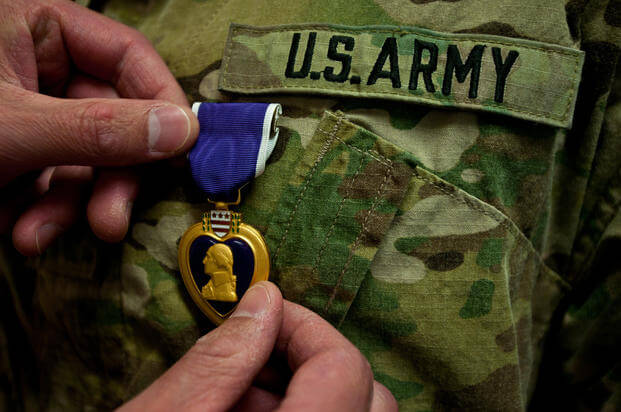Six soldiers in the Middle East have been presented with Purple Hearts after suffering traumatic brain injuries when Iran launched missiles at their base in Iraq in January -- and nearly two dozen more medals are in the works, officials have confirmed.
Army Lt. Gen. Pat White, commander of Combined Joint Task Force - Operation Inherent Resolve, approved 29 Purple Hearts to be awarded to soldiers injured at Al Asad Air Base in Iraq on Jan. 8. Iran carried out the ballistic missile attack in response to a Jan. 3 U.S. drone strike that killed Maj. Gen. Qasem Soleimani, the head of Iran's elite Quds force.
The first six Purple Hearts were presented to soldiers in Iraq on Sunday and in Kuwait on Monday, Cmdr. Zachary Harrell, a spokesman for U.S. Central Command, said. The remaining 23 soldiers whose Purple Hearts were approved by White are expected to receive their awards this week, he added.
Related: US Troops Who Suffered TBIs in Missile Attack Recommended for Purple Hearts
White's decision to award the more than two dozen medals was first reported by CNN.
Individual units were responsible for submitting Purple Heart award packages for troops who'd been injured in the ballistic missile attack. Officials initially reported no one had been injured in the attack, but at least 110 were later diagnosed with traumatic brain injuries.
Harrell said 80 award packages were received by and individually evaluated by a review board. That board submitted their recommendations on the 29 soldiers' Purple Hearts to White.
Two Purple Heart submissions for airmen were reviewed by White, who recommended "against approval," Harrell said.
"It is important to note that a Traumatic Brain Injury (TBI) diagnosis does not automatically qualify a Service Member for Purple Heart eligibility or awarding," Harrell said. "The ... process was designed to be a fair and impartial proceeding that evaluated each case in accordance with applicable regulations."
White's recommendation on those awards has since been sent to Lt. Gen. Joseph Guastella, head of Air Forces Central Command, as he's the final approval authority for airmen, Harrell added.
Airmen at Al Asad and other locations Iran targeted recently recalled the attacks in a series of eyewitness reports released by the Air Force. They described commanders making life-or-death decisions, chaos and lots of emotions.
Bomb after bomb shook the bases for what felt like all night, as one airman described it.
"I had fully accepted that I would die in that shelter with my team," the airman said. "I have never been so happy to see the sunrise."
-- Oriana Pawlyk contributed to this report.
-- Gina Harkins can be reached at gina.harkins@military.com. Follow her on Twitter @ginaaharkins.
Related: Emotions and Chaos': Air Force Releases Eyewitness Accounts of Al Asad Missile Attack












